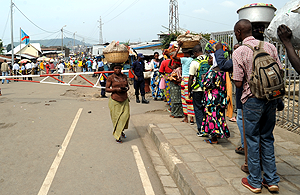Local traders conducting business with their Democratic Republic of Congo (DRC) counterparts are more conscious of the ongoing conflict between the Congolese mutinous soldiers.


Local traders conducting business with their Democratic Republic of Congo (DRC) counterparts are more conscious of the ongoing conflict between the Congolese mutinous soldiers.Tension is particularly high among traders in Rubavu District who frequently cross the border to do business in the border city of Goma of the North Kivu Province in the DRC."There are widespread fears and we are trying as much as possible to avoid some parts in the interior because it is not safe there,” Pascalline Umuhire, a trader who deals in second hand clothes at Gisenyi market said.She disclosed that as a result of the increasing fear, she is obliged to shop in large quantities so that she avoids crossing the border frequently.Umuhire, a Burundian national, explained that on a few occasions she crosses into Goma, she ensures she is back to Rwanda before 6pm."During day time it is mostly safe, but during the evening, sometimes violence breaks out because the security organs there are not reliable,” She explained.The anxiety heightened just less than a week after 11 Rwandan nationals were handed over to the country’s Immigration authorities after allegedly being tortured by DRC’s armed forces.One of them; identified as Claude Byiringiro, said he previously crossed the border about three or four times a week, but he will now think twice before he embarks on a similar mission."After all I went through, I consider myself lucky to be alive today. I am inclined to think that I will never cross that border again,” Byiringiro, a resident of Bugoyi Cell in Gisenyi said.Despite the uncertainty, statistics from Rwanda’s Immigration department show that the average number of people crossing the two borders in Rubavu District has not significantly reduced."The movement across the border seems not to have been altered because the average cross over in both directions is almost constant,” Alphonse Munyurangabo, an official at Rwanda’s Immigration office, said.He disclosed that about 3,000 people cross to either side of the bother daily. A vast number of Rwandans live in DRC, especially students who study in Goma, but Munyurangabo says it was difficult to estimate their number because most of them do not make official declarations to the immigration department while others have dual nationalities.


